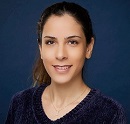Short Webinar Series on Selected Topics in Signal Processing
The Montreal Chapter of the IEEE Signal Processing Society, in collaboration with STARaCom, cordially invites you to attend the following talks, as part of its short webinar series on selected topics in signal processing.
Date and Time
Location
Hosts
Registration
-
 Add Event to Calendar
Add Event to Calendar
- Contact Event Host
-
Prof. Benoit Champagne, ECE Department, McGill University, Montreal.
Speakers
 Alireza Morsali
Alireza Morsali
Generalized Framework for Hybrid A/D Signal Processing in Massive and Ultra-Massive-MIMO Systems
The conventional fully-digital implementation of massive-MIMO systems is not efficient due to the large required number of radio-frequency (RF) chains. To address this issue, hybrid analog/digital (A/D) beamforming was proposed and to date remains a topic of ongoing research. This talk presents the hybrid A/D structure as a general framework for signal processing in massive and ultra-massive-MIMO systems. To exploit the full potential of the analog domain, the analog signal processing (ASP) network is first considered. A mathematical representation is then presented which is suitable for any arbitrarily connected feed-forward ASP network comprised of the common RF hardware elements in the context of hybrid A/D systems, i.e., phase-shifter and power-divider/combiner. An ASP structure is then introduced which is not bound to the unit modulus constraint, thereby facilitating the hybrid A/D systems design. Finally, new precoding and combining designs with proposed ASP structure under different conditions are presented as examples.
Biography:
Alireza Morsali received the B.Sc. and M.Sc. degrees in electrical engineering from Shahid Bahonar University, Kerman, Iran, in 2009, and 2011, respectively. He is currently pursuing the Ph.D. degree at McGill University, Montreal, QC, Canada. His research interests include coding theory, signal processing, wireless communications, and artificial intelligence. He was a recipient of several awards and scholarships, including, the McGill Engineering Doctoral Award, STARaCom Collaborative Grant, and McGill BLUE Fellowship.
Email:
Address:Dept. of Electrical and Computer Engineering, McGill University, Montreal, Quebec, Canada
 Parnian Afshar
Parnian Afshar
Advanced Image Processing and Deep Learning Solutions for COVID-19 Diagnosis/Prognosis based on Chest Images
The Early diagnosis of COVID-19 enables health care professionals and government authorities to break the chain of transition and flatten the epidemic curve. The common type of COVID-19 diagnosis test, however, requires specific equipment and has relatively low sensitivity. Computed tomography (CT) scans and X-ray images, on the other hand, reveal specific manifestations associated with this disease. Overlap with other lung infections makes human-centered diagnosis of COVID-19 challenging. We, first, present a Capsule Network-based modeling framework, referred to as the COVID-CAPS, to identify COVID-19 positive cases from X-ray images. As CT scan is more sensitive and accurate compared to X-ray images, we introduce our new COVID-19 CT scan dataset (referred to as COVID-CT-MD), including normal, COVID-19, and common acquired pneumonia cases. This dataset is carefully labeled to include patient-level, slice-level, and lobe-level labels. Finally, we will present our Capsule Network-based framework developed to identify COVID-19 cases in the newly introduced dataset.
Biography:
Parnian Afshar is a Ph.D. candidate at Concordia Institute for Information System Engineering (CIISE) and is the 1st ranked recipient of the prestigious Quebec Merit Scholarship Award for Foreign Students (PBEEE). Her research interests include machine learning, biomedical image and video processing, pattern recognition, and deep learning. She has extensive research/publication record in medical image processing related areas.
Email:
Address:Dept of Electrical and Computer Eng., CIISE, Concordia University, Montreal, Quebec, Canada

